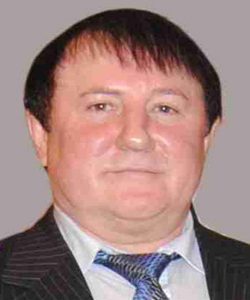
PhD, Grand PhD, Prof. Leonid Tsapu
New technologies and different innovation as well as conduction of structural, organizational and economic reforms makes possible to promote Russian economy, overcome stagnations and recessions and ends of world economic crisis.
Theoretical developed works in the field of Nanotechnologies and its practical usage could be approved that prospective points of progress as technical as well as economical in the global scale.
Let`s recall Eric Drexler’s speech who is one of the first “nano-ideology” researchers: nano technology is ”excepted manufacture technology oriented for cheap providing of devices and substances with previously designed nuclear structure”.( Russia should make the most important that is substance production).
Nano-technologies includes processes of separate nuclear and compounds handling. Manufactured production is newly elaborated materials and presented with independent structure or article for operation.
Up-to-date directions of scientific research works and design developments are created in the field of electronics, medicine, defense and others and of course in the section of construction on the background of nano-technologies.
Application of nano-technologies makes possible innovations in the wide range of scientific-manufacturing enterprises.
Leader in creation, development and application of nano-technologies are the USA and Japan, developed European countries and Korea Republic. Unfortunately, there is no seen Russia in this list, but from two thousand year In Russia there were accepted 9 State programs and founded more than twenty enterprises, for example: CENTRNANO, ROSNANO State Corporation and etc.
There is no good results received. Enquiries on widening of financial help are not very reliable. Rested funds are not very efficient or used not for purpose or not applied. Generally speaking, it is concerned on weak coordinating of creation and development of nano-technologies
Today it is possible to give few examples of some success and results of Russian science in nano-technologies and production.
Results of research works in nano-technology often stay in scientific universities and laboratories more few examples of practical results and of course more resultative creation features are reached.
At the same time , according to the declared purposes of the domestic volume of nano-production in 2015 in terms of value should be around 1 trillion . rub. ( For comparison, the volume of nano production in the world to the same period is estimated about more than one trillion Dollars).
Therefore , the main task is to create a domestic nano-industry selection of the appropriate segment for new productions .
Russia is unlikely to achieve in the foreseeable future in significant advances of such rapidly developing areas such as the creation of nano-electronics or products organized on the basis of nano-substances. In these segments principally defined and continue to develop an American or Japanese nano products and technologies . Americans are trying to compete in the European and Korean companies . The same phenomenon was observed in the field of medicine and biology.
Therefore, the main task of the Russian science and practice is the choice of areas in which Russia can be sucssessfull. These areas , in our view , should include composite materials and ultrafine , ie nano powders.
This does not mean that the work in the other segments of nanotechnology and nano-products production should be reduced. Here we should pay attention only to the fact that the development of nanotechnology in the field of future directions will ensure execution of tasks.
But even focusing on priority work , keep in mind that this will require the development of related technologies , in particular for producing nanostructures , nanomaterials and nanodevices.
Another important task is to address and resolve complex problems in a particular segment of the nanotechnology industry. Necessary justification related industries, ranging from accommodation, including execution and related industries, and the final product sale . Russia has already faced irresponsible attitude when creating expensive facilities nanoindustry when multibillion expenses only after it became clear that this company has been operating in China that domestic production will be much more expensive than that not competitive and demand is not expected.
Thus, even creating the corresponding cluster industries, should take care of the demand.
Taking into account the nature of the market economy , the presence of competition , the impact of innovation, etc. can foresee difficulties in finding the best option for the price and quality for the end nanoproduct. Therefore, such a marketing innovative products is the most important line of business.
In this regard, it should clarify the features of nano – commodity . Considering nanoproduct or nanomaterial as usual market goods , taking into account its new qualities and properties. These products are characterized by high reliability, durability , safety , etc. , and the markets for these products have already been established.
In another implementation of the present market , the so-called “hidden result.” In this case the final product has improved qualities that provides a competitive advantage. There is no replacement of old products , and there is a process improvement or modernization.
However , exactly what products or materials contained in the final product are nano-production unknown. Such products shall be protected as intellectual property or as a trade secret of the manufacturer or seller. It can be assumed that the free market will adjust supply and demand . But this argument does not seem convincing.
But how to determine the real price of the product , and hence the capacity of the market and the volume of production in the end. This is a task for economists in the near future.
The construction industry can become a locomotive of its kind in the performance of public tasks for the production of nano-materials and nano-products in the required quantities . As mentioned domestic nanotechnologies without fear of competition and at the appropriate state care can meet the demand , both domestically and in a certain part of the external materials such as nanopowders and composites used in construction. With the final product when using these nanomaterials can be concrete and reinforced concrete , coatings of different composition and purpose , design and construction , etc.
Consider briefly how affect nano products , in this case , the quality of the powder mass building material like concrete . Thus the use of silica nanoparticles in a standard concrete mix to a significant strengthening of concrete and to improve its mechanical properties.
A minor amount of the additive of multilayer nanotubes to conventional materials , such as Portland cement provides a significant improvement in the compressive strength of the material and its flexural strength.
Weight of concrete structures below five times , and the final price is 2-3 times lower.
The structural concrete additives comprising nanopowder gaining greater impact and fatigue strength of several times higher than the corresponding figures ordinary reinforced concrete. Durability of such purged , according to the literature , from 2 to 5 times higher than normal concrete.
Nanoconcrete applied as pavement (USA), in the construction of airfields ( USA, Germany ).
Nanoconcrete also started to use in Russia , for example, in the construction of the bridge in Kimri town.
Even wooden houses or wooden part of the house treated nanoliquid, greatly increase its service life , and will not be subject to any mold or pests.
Paints and varnishes , prepared in a mixture of nanoparticles are resistant to sunlight and are durable.
Great opportunity is the use of nanomaterials in various kinds of metal structures including and construction.
Additives vanadium or molybdenum nanoparticles alters the microstructure of the material , dramatically increasing the damage threshold of steel products from fatigue.
Additive magnesium nanoparticles welding materials significantly increases the strength of joints , etc.
Speaking on the implementation of nano –technolgies can not be ignoring the question of standardization of products , materials and composites . Standardization aims to ensure interaction of nano any execution and destination. Standardization provides access to nano-products on the market and its competitive implementation. Unacceptable to believe that over time all by itself organized.
Comparing the list of possibilities for the use of nanomaterials with the actual implementation , we should recognize that the actual use in the production of nano- negligible.
The reasons for such a condition is known: poor organization, weak leadership , lack of interest of business. Russia is again in the role of “catching up” . The so-called public- private cooperation in the implementation of innovation remains wishful thinking.
The main thing is that the access to the improving of condition of affairs is registered. This elimination of bureaucracy , the need for a timely response to the global innovation trends, identification of business interest in cooperation with the state.
It would seem that the obvious advantages of nanomaterials , in particular in the construction , should encourage construction firms and companies to widespread innovation. However, you can find only rare examples of innovations. Building and civil engineering waits and why change something . Buyer still has it and buy it. A where to go. And change is hard . And they will lay the same road , and repair them almost every year.
Built a whole chain of interacting businesses and universities. And every character has its own commercial or corporate or personal interest.
There was no need to repeat as a mantra , that “free” market all balances. If Russia really learns from advanced countries , we would learn from the experience and state regulation in special situations.


